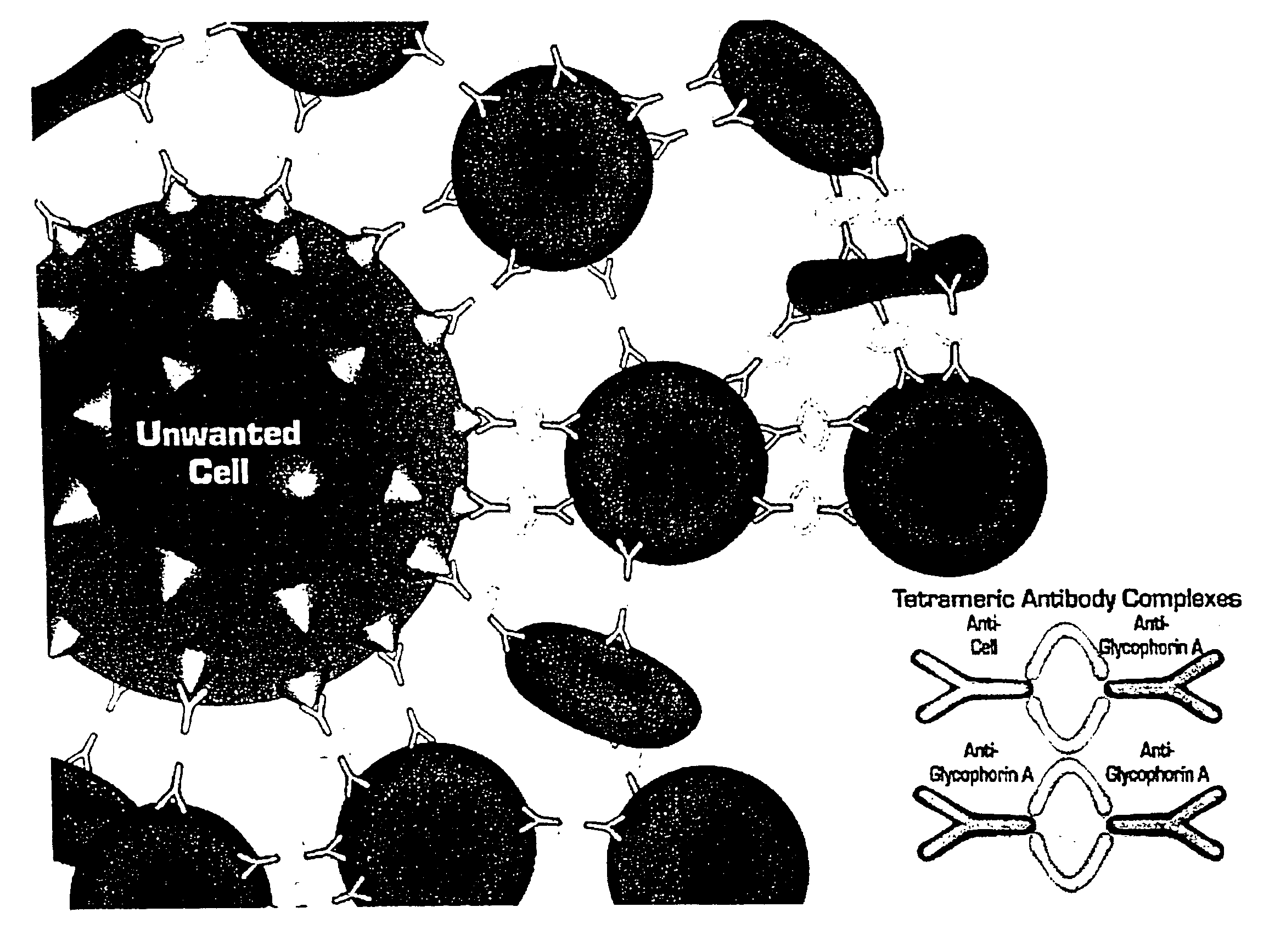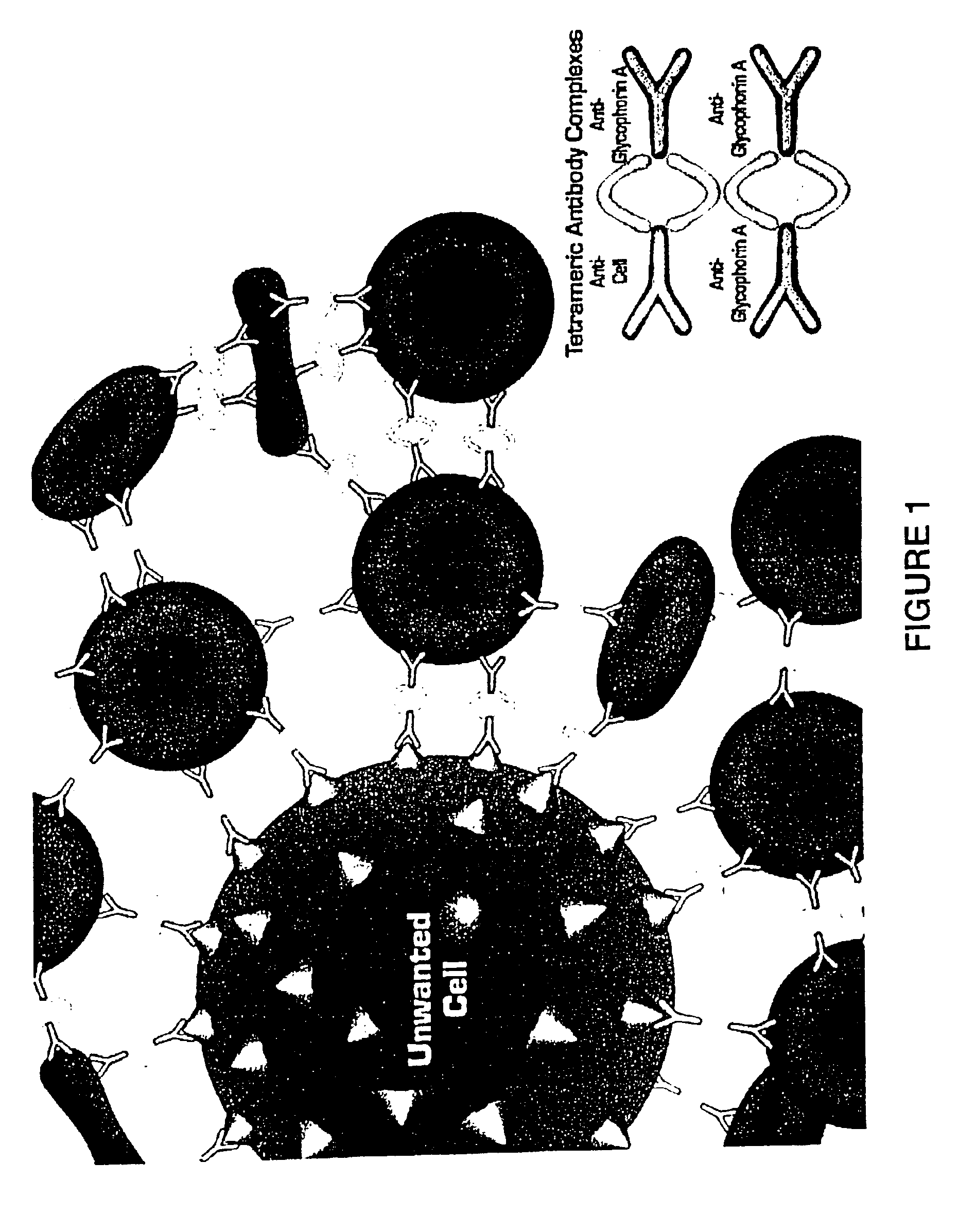Method for separating cells using immunorosettes
a cell and immunoselective technology, applied in the field of immunoselective cell separation, can solve the problems of inability to detect metastatic cells, inability to carry out steps, and incur cell loss, and achieve the effect of improving t cell enrichment and increasing the purity of cd3+ cells
- Summary
- Abstract
- Description
- Claims
- Application Information
AI Technical Summary
Problems solved by technology
Method used
Image
Examples
example 1
Preparation of Tetramers
In order to prepare a tetrameric antibody complex for use in the method of the present invention, the following protocol may be used: (a) take 1 mg of antibody specific for cells to be rosetted (e.g. anti-CD2, CD3, CD4, CD8, CD14, CD16, CD19 etc.); (b) add 3 mg anti-Glycophorin A antibody (against red blood cells); mix well (c) then add 4.0 mg of P9 antibody or 2.72 mg of the P9 F(ab′)2 antibody fragment. Incubate overnight at 37° C. The P9 antibody binds the Fc portion of the antibodies added in steps (a) and (b) resulting in a tetrameric antibody complex. For more information on the preparation of tetramers see U.S. Pat. No. 4,868,109 to Lansdorp, which is incorporated herein by reference. Tetrameric antibody complexes incorporating different antibodies to antigens expressed or nucleated cells are prepared separately and then mixed.
The antibody compositions are made by combining various tetrameric antibody complexes depending on which cells one wishes to de...
example 2
Method of Immunorosetting Using Ficoll
A negative selection protocol for immunorosetting cells from whole peripheral blood using Ficoll Hypaque is set out below.1. Add 100 μL antibody composition per mL of whole peripheral blood.2. Incubate 20 minutes at room temperature.3. Dilute sample with an equal volume of phosphate buffered saline (PBS)+2% fetal calf serum (FCS) and mix gently.4. Layer the diluted sample on top of Ficoll Hypaque or layer the Ficoll underneath the diluted sample.5. Centrifuge for 20 minutes at 1200×g, room temperature, with the brake off.6. Remove the enriched cells from the Ficoll:plasma interface.7. Wash enriched cells with 5-10×volume of PBS+2% FBS.
Note: For enrichment of monocytes and other adherent cells, add 1 mM EDTA to the sample of whole blood and to all wash / dilution solutions.
example 3
Method of Immunorosetting Using Hetastarch Sedimentation
A negative selection protocol for immunorosetting cells from whole peripheral blood using hetastarch is set out below. Hetastarch is one of a number of compounds that increases red blood cell sedimentation rates through agglutination.1. Add 1 mL of 6% hetastarch in saline per 5 mL of blood and mix.2. Add antibody composition described in Example 1 to whole blood such that each anti-nucleated cell antibody is at a final concentration of 1.0-2.0 μg / mL.3. Incubate 10 minutes at room temperature.4. Centrifuge for 5 minutes at 50×g, room temperature.5. Remove supernatant. This fraction contains the enriched cells.6. Wash enriched cell fraction with 2-5×volume of PBS+2% fetal bovine serum (FBS).
PUM
| Property | Measurement | Unit |
|---|---|---|
| concentration | aaaaa | aaaaa |
| volume | aaaaa | aaaaa |
| density | aaaaa | aaaaa |
Abstract
Description
Claims
Application Information
 Login to View More
Login to View More - R&D
- Intellectual Property
- Life Sciences
- Materials
- Tech Scout
- Unparalleled Data Quality
- Higher Quality Content
- 60% Fewer Hallucinations
Browse by: Latest US Patents, China's latest patents, Technical Efficacy Thesaurus, Application Domain, Technology Topic, Popular Technical Reports.
© 2025 PatSnap. All rights reserved.Legal|Privacy policy|Modern Slavery Act Transparency Statement|Sitemap|About US| Contact US: help@patsnap.com


